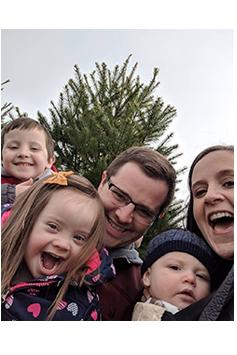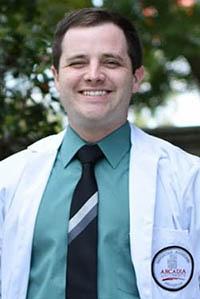Schinella ’21MMS Leans on Family to Find His Passion
By Katherine Haines ’21

When Physician Assistant student Jeffrey Schinella ’21MMS found out his second child, Joy, would likely be born with Downs Syndrome, it sent him down a path he never expected.
After graduating from Indiana University with a Religion and East Asian Studies degree in 2010, Schinella had no medical experience when he discovered his passion for helping others going through the health care system.
“I always felt the push to do more, but the medical part came in for me when my daughter was born in 2014,” said Schinella, who was working as an auto claims appraiser for Progressive Insurance at the time. “I basically went from no exposure growing up to the whole world of medicine, to suddenly being at doctors appointments and having this new little baby who needed a lot of care.”
However, with a non-medical undergraduate degree, the road to a medical degree wouldn’t be short. In 2015, Schinella started taking prerequisite classes at Delaware County Community College to fulfill the requirements to enroll in a Physician Assistant (PA) program.
“I almost feel like working in insurance prepared me really well for the other aspects of medicine that a lot of people don’t readily think about like patient interaction, communication skills, and being comfortable talking to people who are upset or angry when you’re giving them bad news,” said Schinella. “All of that I was pretty comfortable with already, so I could just focus on the medical knowledge.”
In 2019, Schinella finished his prerequisite courses and enrolled in the PA program at Arcadia. One of the difficulties of going back to school was balancing being a parent and a student. Fortunately for Schinella, he had a supportive and encouraging spouse to help him stay balanced.
“From the time that we’re having dinner together to when they’re going to bed, I just enjoy right now,” said Schinella. “I just try and stay in the moment and that’s the best I can do.”
The PA program is made up of two years: the first is a didactic year, while the second year is primarily made up of clinical work. As part of the PA program, the students experience a total of 11 rotations, the first seven being in the core studies of Emergency Medicine, Family Medicine, Behavioral Medicine, Internal Medicine, Women’s Health, Pediatrics, and Surgery. One of the core rotation areas gets repeated, and then students are allowed to pick three additional elective areas that they are interested in, with each rotation lasting four weeks.
During his didactic year, Schinella worked as a Graduate Assistant helping to run the guest lectures. However, the COVID-19 pandemic disrupted the clinical rotation schedule.
“We were delayed in starting, so our first two rotations were more virtual experiences and we weren’t out seeing patients,” said Schinella. “I’ve found that even though maybe I’ve only done two electives this year instead of the three, I’m seeing such different things at each site and it’s been really helpful.”

His first rotation began in July at Holy Redeemer Hospital, where he worked in the pediatric urgent care and emergency room with pediatric patients.
“That was a great way to be introduced to medicine because you’re seeing acute problems in the ER, sometimes the urgent care was a little more difficult, but the providers there were incredibly helpful,” said Schinella. “I also liked that I wasn’t working with the same doctor every day, so I got to see the style of a lot of different providers all at once.”
Schinella also completed rotations at Brandywine/Tower Health Emergency Department, Brandywine/Tower Health Psychiatric Department, and Pennsylvania Hospital ENT Department. He finds working with children is what he’s most interested in pursuing, so he will be working in the neonatal intensive care unit (NICU) at Children’s Hospital of Philadelphia after graduation through a residency program.
“It will be amazing to work with some of the tiniest babies in the NICU who have a lot of needs, being premature and having complicated issues,” said Schinella.
Through his clinical rotations, Schinella knows he’s made the right move for his career by pursuing a Master of Medical Science degree.
“I feel like the whole program has confirmed this calling to have a positive impact on people’s lives,” said Schinella. “I always have hope for the future, for changing situations that you’re not happy with and to try. I feel so fortunate to be where I’m at right now.”


